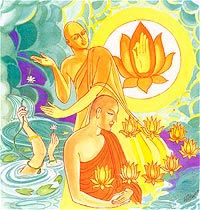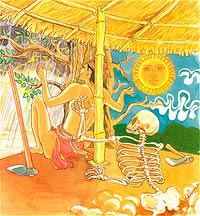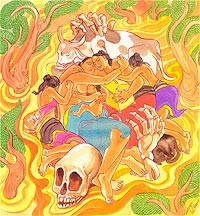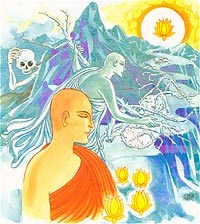through
http://sarvajan.ambedkar.org
sabbe satta bhavantu sukhi-tatta
TIPITAKA
TIPITAKA AND TWELVE DIVISIONS
Brief historical background
Sutta Pitaka
Vinaya Pitaka
Abhidhamma Pitaka
Twelve Divisions of Buddhist Canons
Nine Divisions of Buddhist Canons
Sutta Piṭaka
— The basket of discourses —Mahāsatipaṭṭhāna Sutta (DN 22) {excerpt} - all infobubbles— Attendance on awareness —Kāyānupassanā
IV. சட்டத்துக்கு அடிப்படையான அற முறைகளின் கூர்ந்த கவனிப்பு
D.Bojjhaṅgas மீதான பிரிவு
Dhammapada Verse 285 Suvannakaratthera Vatthu-Path To Peace
Verse 286. Mahadhanavanija Vatthu The Fear Of Death -Verse 287. Kisagotami Vatthu Death Takes Away The Attached - Verses 288 and 289 Patacara Vatthu - Verse 288. No Protection When Needed -Verse 289. The Path To The Deathless
ABOUT AWAKEN ONES WITH AWARENESS Australia
Australian Capital Territory
• Mahamevnawa Buddhist Monastery (Sri Lankan)
Most
worrying issue is that the statue of Baba Saheb Ambedkar was broken, it
has hurt the sentiments of SC/STs, Bahujan Samaj Party (BSP) leader Mayawati said.
Rajya Sabha adjourned till 2 p.m.
New Delhi, Aug 8 — The Rajya Sabha was adjourned for a second time till 2 p.m. Wednesday, the first day of monsoon session.
This sutta is widely considered as a the main reference for meditation practice.
Puna ca·paraṃ, bhikkhave, bhikkhu dhammesu dhammānupassī viharati, sattasu bojjhaṅgesu. Kathaṃ ca pana, bhikkhave, bhikkhu dhammesu cittānupassī viharati, sattasu bojjhaṅgesu? |
தமிழ் IV. சட்டத்துக்கு அடிப்படையான அற முறைகளின் கூர்ந்த கவனிப்பு D.Bojjhaṅgas மீதான பிரிவு And furthermore, bhikkhus, a bhikkhu dwells observing dhammas in dhammas with reference to the seven bojjhaṅgas. And furthermore, bhikkhus, how does a bhikkhu dwell observing dhammas in dhammas with reference to the seven bojjhaṅgas?
|
|
Idha, bhikkhave, bhikkhu santaṃ vā ajjhattaṃ sati·sambojjhaṅgaṃ ‘atthi me ajjhattaṃ sati·sambojjhaṅgo’ ti pajānāti; a·santaṃ vā ajjhattaṃ sati·sambojjhaṅgaṃ ‘n·atthi me ajjhattaṃ sati·sambojjhaṅgo’ ti pajānāti; yathā ca an·uppannassa sati·sambojjhaṅgassa uppādo hoti taṃ ca pajānāti; yathā ca uppannassa sati·sambojjhaṅgassa bhāvanāya pāripūrī hoti taṃ ca pajānāti. |
Here, bhikkhus, a bhikkhu, there being the sati sambojjhaṅga present within, understands: “there is the sati sambojjhaṅga within me”; there not being the sati sambojjhaṅga present within, he understands: “there is no sati sambojjhaṅga within me”; he understands how the unarisen sati sambojjhaṅga comes to arise; he understands how the arisen sati sambojjhaṅga is developed to perfection. இங்கு, |
|
Santaṃ vā ajjhattaṃ dhammavicaya·sambojjhaṅgaṃ ‘atthi me ajjhattaṃ dhammavicaya·sambojjhaṅgo’ ti pajānāti; a·santaṃ vā ajjhattaṃ dhammavicaya·sambojjhaṅgaṃ ‘n·atthi me ajjhattaṃ dhammavicaya·sambojjhaṅgo’ ti pajānāti; yathā ca an·uppannassa dhammavicaya·sambojjhaṅgassa uppādo hoti taṃ ca pajānāti; yathā ca uppannassa dhammavicaya·sambojjhaṅgassa bhāvanāya pāripūrī hoti taṃ ca pajānāti. |
There being the dhammavicaya sambojjhaṅga present within, he understands: “there is the dhammavicaya sambojjhaṅga within me”; there not being the dhammavicaya sambojjhaṅga present within, he understands: “there is no dhammavicaya sambojjhaṅga within me”; he understands how the unarisen dhammavicaya sambojjhaṅga comes to arise; he understands how the arisen dhammavicaya sambojjhaṅga is developed to perfection. அவ்விடத்தில் dhammavicaya sambojjhaṅga |
|
Santaṃ vā ajjhattaṃ vīriya·sambojjhaṅgaṃ ‘atthi me ajjhattaṃ vīriya·sambojjhaṅgo’ ti pajānāti; a·santaṃ vā ajjhattaṃ vīriya·sambojjhaṅgaṃ ‘n·atthi me ajjhattaṃ vīriya·sambojjhaṅgo’ ti pajānāti; yathā ca an·uppannassa vīriya·sambojjhaṅgassa uppādo hoti taṃ ca pajānāti; yathā ca uppannassa vīriya·sambojjhaṅgassa bhāvanāya pāripūrī hoti taṃ ca pajānāti. |
There being the vīriya sambojjhaṅga present within, he understands: “there is the vīriya sambojjhaṅga within me”; there not being the vīriya sambojjhaṅga present within, he understands: “there is no vīriya sambojjhaṅga within me”; he understands how the unarisen vīriya sambojjhaṅga comes to arise; he understands how the arisen vīriya sambojjhaṅga is developed to perfection. அவ்விடத்தில் vīriya sambojjh aṅga திடமான |
|
Santaṃ vā ajjhattaṃ pīti·sambojjhaṅgaṃ ‘atthi me ajjhattaṃ pīti·sambojjhaṅgo’ ti pajānāti; a·santaṃ vā ajjhattaṃ pīti·sambojjhaṅgaṃ ‘n·atthi me ajjhattaṃ pīti·sambojjhaṅgo’ ti pajānāti; yathā ca an·uppannassa pīti·sambojjhaṅgassa uppādo hoti taṃ ca pajānāti; yathā ca uppannassa pīti·sambojjhaṅgassa bhāvanāya pāripūrī hoti taṃ ca pajānāti. |
There being the pīti sambojjhaṅga present within, he understands: “there is the pīti sambojjhaṅga within me”; there not being the pīti sambojjhaṅga present within, he understands: “there is no pīti sambojjhaṅga within me”; he understands how the unarisen pīti sambojjhaṅga comes to arise; he understands how the arisen pīti sambojjhaṅga is developed to perfection. |
|
Santaṃ vā ajjhattaṃ passaddhi·sambojjhaṅgaṃ ‘atthi me ajjhattaṃ passaddhi·sambojjhaṅgo’ ti pajānāti; a·santaṃ vā ajjhattaṃ passaddhi·sambojjhaṅgaṃ ‘n·atthi me ajjhattaṃ passaddhi·sambojjhaṅgo’ ti pajānāti; yathā ca an·uppannassa passaddhi·sambojjhaṅgassa uppādo hoti taṃ ca pajānāti; yathā ca uppannassa passaddhi·sambojjhaṅgassa bhāvanāya pāripūrī hoti taṃ ca pajānāti. |
There being the passaddhi sambojjhaṅga present within, he understands: “there is the passaddhi sambojjhaṅga within me”; there not being the passaddhi sambojjhaṅga present within, he understands: “there is no passaddhi sambojjhaṅga within me”; he understands how the unarisen passaddhi sambojjhaṅga comes to arise; he understands how the arisen passaddhi sambojjhaṅga is developed to perfection. |
|
Santaṃ vā ajjhattaṃ samādhi·sambojjhaṅgaṃ ‘atthi me ajjhattaṃ samādhi·sambojjhaṅgo’ ti pajānāti; a·santaṃ vā ajjhattaṃ samādhi·sambojjhaṅgaṃ ‘n·atthi me ajjhattaṃ samādhi·sambojjhaṅgo’ ti pajānāti; yathā ca an·uppannassa samādhi·sambojjhaṅgassa uppādo hoti taṃ ca pajānāti; yathā ca uppannassa samādhi·sambojjhaṅgassa bhāvanāya pāripūrī hoti taṃ ca pajānāti. |
There being the samādhi sambojjhaṅga present within, he understands: “there is the samādhi sambojjhaṅga within me”; there not being the samādhi sambojjhaṅga present within, he understands: “there is no samādhi sambojjhaṅga within me”; he understands how the unarisen samādhi sambojjhaṅga comes to arise; he understands how the arisen samādhi sambojjhaṅga is developed to perfection. |
|
Santaṃ vā ajjhattaṃ upekkhā·sambojjhaṅgaṃ ‘atthi me ajjhattaṃ upekkhā·sambojjhaṅgo’ ti pajānāti; a·santaṃ vā ajjhattaṃ upekkhā·sambojjhaṅgaṃ ‘n·atthi me ajjhattaṃ upekkhā·sambojjhaṅgo’ ti pajānāti; yathā ca an·uppannassa upekkhā·sambojjhaṅgassa uppādo hoti taṃ ca pajānāti; yathā ca uppannassa upekkhā·sambojjhaṅgassa bhāvanāya pāripūrī hoti taṃ ca pajānāti. |
There being the upekkhā sambojjhaṅga present within, he understands: “there is the upekkhā sambojjhaṅga within me”; there not being the upekkhā sambojjhaṅga present within, he understands: “there is no upekkhā sambojjhaṅga within me”; he understands how the unarisen upekkhā sambojjhaṅga comes to arise; he understands how the arisen upekkhā sambojjhaṅga is developed to perfection. |
|
Iti ajjhattaṃ vā dhammesu dhammānupassī viharati, bahiddhā vā dhammesu dhammānupassī viharati, ajjhatta-bahiddhā vā dhammesu dhammānupassī viharati; samudaya-dhamm·ānupassī vā dhammesu viharati, vaya-dhamm·ānupassī vā dhammesu viharati, samudaya-vaya-dhamm·ānupassī vā dhammesu viharati; ‘atthi dhammā’ ti vā pan·assa sati paccupaṭṭhitā hoti, yāvadeva ñāṇa·mattāya paṭissati·mattāya, a·nissito ca viharati, na ca kiñci loke upādiyati. Evam·pi kho, bhikkhave, bhikkhu dhammesu dhammānupassī viharati, sattasu bojjhaṅgesu. |
Thus he dwells observing dhammas in dhammas internally, or he dwells observing dhammas in dhammas externally, or he dwells observing dhammas in dhammas internally and externally; he dwells observing the samudaya of phenomena in dhammas, or he dwells observing the passing away of phenomena in dhammas, or he dwells observing the samudaya and passing away of phenomena in dhammas; or else, [realizing:] “these are dhammas!” sati is present in him, just to the extent of mere ñāṇa and mere paṭissati, he dwells detached, and does not cling to anything in the world. Thus, bhikkhus, a bhikkhu dwells observing dhammas in dhammas, with reference to the seven bojjhaṅgas. |

Verse 285. Path To Peace
Cut off affection for oneself
as a hand a lily in the Fall.
Cultivate this peaceful path,
Nibbana by the Buddha taught.
Explanation: Just like a person plucking out a lily with one’s
own hand, pluck out your self-attachment. Cultivate the path to Nibbana,
as advocated
Dhammapada Verse 285
Suvannakaratthera VatthuUcchinda sinehamattano
kumudam saradikamva panina
santimaggameva1 bruhaya
Nibbanam sugatena desitam.Verse 285: Cut off your craving as one plucks an autumn lily with the hand.
Nibbana has been expounded on by the Buddha; cultivate that Path which leads to
it.
1. santimaggam: the Path that leads to Nibbana, i.e. the Path with Eight
Constituents.
The Story of a Thera who had been a Goldsmith
While residing at the Jetavana monastery, the Buddha uttered Verse (285) of
this book, with reference to a bhikkhu, a pupil of Thera Sariputta.Once, a young, handsome son of a goldsmith was admitted into the Order by
Thera Sariputta. The young bhikkhu was given loathsomeness of the dead body as
the subject of meditation by Thera Sariputta. After taking the subject of
meditation he left for the forest and practised meditation there; but he made
very little progress. So he returned twice to Thera Sariputta for further
instructions. Still, he made no progress. So Thera Sariputta took the young
bhikkhu to the Buddha, and related everything about the young bhikkhu.The Buddha knew that the young bhikkhu was the son of a goldsmith, and also
that he had been born in the family of goldsmiths during his past five hundred
existences. Therefore the Buddha changed the subject of meditation for the young
bhikkhu; instead of loathsomeness, he was instructed to meditate on
pleasantness. With his supernormal power, the Buddha created a beautiful lotus
flower as big as a cart-wheel and told the young bhikkhu to stick it on the
mound of sand just outside the monastery. The young bhikkhu, concentrating on
the big, beautiful, fragrant lotus flower, was able to get rid of the
hindrances. He was filled with delightful satisfaction (piti), and step by step
he progressed until he reached as far as the fourth level of mental absorption
(jhana).The Buddha saw him from his perfumed chamber and with his supernormal power
made the flower wither instantly. Seeing the flower wither and change its
colour, the bhikkhu perceived the impermanent nature of the flower and of all
other things and beings. That led to the realization of the impermanence,
unsatisfactoriness and the insubstantiality of all conditioned things. At that
instant, the Buddha sent forth his radiance and appeared as if in person to the
young bhikkhu and instructed him to get rid of craving (tanha).Then the Buddha spoke in verse as follows:
Verse 285: Cut off your craving as one plucks an
autumn lily with the hand. Nibbana has been expounded on by the
Buddha; cultivate that Path which leads to it.
At the end of the discourse the young bhikkhu attained arahatship.
Verse 286. The Fear Of Death
Here shall I spend the Rains,
here the Winter, here the Summer.
Thus speculates the fool,
the danger he knows not.Explanation: In the four months during retreat, winter or
summer in a chosen place, the ignorant plans unaware of the threat
of death.
Dhammapada Verse 286
Mahadhanavanija VatthuIdha vassam vasissami
idha hemantagimhisu
iti balo vicinteti
antarayam na bujjhati.Verse 286: “Here will I live in the rainy season; here will I live in
the cold season and the hot season”, so imagines the fool, not realizing
the danger (of approaching death).
The Story of Mahadhana, a Merchant
While residing at the Jetavana monastery, the Buddha uttered Verse (286) of
this book, with reference to Mahadhana, a merchant from Baranasi.Once, a merchant from Baranasi came to a festival in Savatthi with five
hundred carts fully loaded with textiles and other merchandise. When he reached
a river bank near Savatthi the river was in spate; so he could not cross the
river. He was held up for seven days as it was raining hard and the water did
not subside. By that time, he was already late for the festival, and there was
no need for him to cross the river.Since he had come from a long distance he did not want to return home with
his full load of merchandise. So he decided to spend the rainy season, the cold
season and the hot season in that place and said so to his assistants. The
Buddha while going on an alms-round knew the decision of the merchant and he
smiled. Ananda asked the Buddha why he smiled and the Buddha replied,
“Ananda, do you see that merchant? He is thinking that he would stay here
and sell his goods the whole year. He is not aware that he would die here in
seven days’ time. What should be done should be done today. Who would know that
one would die tomorrow? We have no date fixed with the King of Death. For one
who is mindful by day or by night, who is not disturbed by moral defilements and
is energetic, to live for just one night is a well-spent life.”Then the Buddha sent Ananda to Mahadhana, the merchant. Ananda explained to
Mahadhana that time was running out for him, and that he should practise
mindfulness instead of being negligent. On learning about his impending death,
Mahadhana was alarmed and frightened. So, for seven days, he invited the Buddha
and other bhikkhus for alms-food. On the seventh day, the Buddha expounded a
discourse in appreciation (anumodana).Then the Buddha spoke in verse as follows:
Verse 286: “Here will I live in the rainy season;
here will I live in the cold season and the hot season”, so
imagines the fool, not realizing the danger (of approaching death).
At the end of the discourse Mahadhana the merchant attained Sotapatti
Fruition. He followed the Buddha for some distance and returned. On his return,
he had a severe headache and passed away soon after. Mahadhana was reborn in the
Tusita deva world.
Verse 287. Death Takes Away The Attached
For one who has a clinging mind
and finds delight in babes and herds
Death does seize and carry away
as great flood a sleeping village.Explanation: Men are proud that they process children, cattle
and other forms of wealth. They tend to be proud that way because
their minds are overcome with blemishes. Floods sweep away a sleeping
village, taking along all its people and their possessions. In the
same way, death comes unaware and sweeps along the people however
proud they are of their possessions.
Dhammapada Verse 287
Kisagotami VatthuTam puttapasusammattam
byasattamanasam naram
suttam gamam mahoghova
maccu adaya gacchati.Verse 287: The man who dotes on his children and his herds of cattle, whose
mind longs for and is attached to sensual pleasures, is carried away by Death
even as a sleeping village is swept away by a great flood.
The Story of Kisagotami*
While residing at the Jetavana monastery, the Buddha uttered Verse (287) of
this book, with reference to Kisagotami, the daughter of a rich man from
Savatthi.Kisagotami came to the Buddha as she was stricken with grief due to the death
of her only son. To her the Buddha said, “Kisagotami, you think you are
the only one who has lost a son. Death comes to all beings; before their desires
are satiated Death takes them away.”Then the Buddha spoke in verse as follows:
Verse 287: The man who dotes on his children and his
herds of cattle, whose mind longs for and is attached to sensual
pleasures, is carried away by Death even as a sleeping village is
swept away by a great flood.
At the end of the discourse Kisagotami attained Sotapatti Fruition.
* This story has been given in Verse 114,
Chapter VIII - Story No. 13.
Verse 288. No Protection When Needed
No sons are there for shelter
nor father nor related folk,
one by the Death-king seized upon
in kin no shelter finds.Explanation: When and individual is gripped by death, sons
cannot protect one. Not even one’s father can shield a person
from the grip of death. Nor can one’s relations come to the rescue.
Verse 289. The Path To The Deathless
Having understood this fact
the wise by virtue well-restrained
swiftly then should clear the path
leading to Nibbana.Explanation: Being aware that no one can rescue you from death,
the wise person, who is restrained and disciplined, should clear the
path to Nibbana, without any loss of time.
Dhammapada Verses 288 and 289
Patacara VatthuNa santi putta tanaya
na pita napi bandhava
antakena’ dhipannassa
natthi natisu tanata.Etamatthavasam natva
pandito silasamvuto
nibbanagamanam maggam
khippameva visodhaye.Verse 288: Not sons, nor parents, nor close relatives can protect one
assailed by Death; indeed, neither kith nor kin can give protection.Verse 289: Knowing this, the wise man restrained by morality should quickly
clear (the obstacles to) the Path leading to Nibbana.
The Story of Patacara*
While residing at the Jetavana monastery, the Buddha uttered Verses (288) and
(289) of this book, with reference to Patacara, the daughter of a rich man from
Savatthi.As Patacara had lost her husband and her two sons, as well as her parents and
three brothers almost at the same time, she was driven to near insanity. When
she approached the Buddha, he said to her, “Patacara, sons and daughters
cannot look after you; so even if they are alive they do not exist for you. The
wise man observes morality (sila) and clears (the obstacles to) the Path leading
to Nibbana.”Then the Buddha spoke in verse as follows:
Verse 288: Not sons, nor parents, nor close
relatives can protect one assailed by Death; indeed, neither kith nor
kin can give protection.Verse 289: Knowing this, the wise man restrained
by morality should quickly clear (the obstacles to) the Path leading
to Nibbana.
At the end of the discourse Patacara attained Sotapatti Fruition.
* This story has been given in Verse
113, Chapter VIII - Story No. 12.End of Chapter Twenty: The Path
ALL ABOUT AWAKEN ONES WITH AWARENESS Australia in
the EYES of

UPASAKA JAGATHEESAN CHANDRASEKHARAN
Australia
Australian Capital Territory
• Mahamevnawa Buddhist Monastery (Sri Lankan)
http://en.wikipedia.org/wiki/Mahamevnawa_Buddhist_Monastery
| This article relies on references to primary sources or sources affiliated with the subject. (May 2011) |
| Mahamevnawa Buddhist Monastery | |
|---|---|
| Motto | The world that Buddha saw |
| Formation | 14 August 1999 |
| Type | Organization of Buddhist monasteries |
| Purpose/focus | Spiritual Development |
| Headquarters | Polgahawela, Sri Lanka |
| Location | Sri Lanka (35 branches); Toronto, CA; New Jersey, USA; Sydney, AU; London, UK; Offenbach, DE (List of Mahamevnawa Branches) |
| Region served | Worldwide |
| Membership | practicing Buddhists |
| Founder | Kiribathgoda Gnanananda Thero |
| Website | http://www.mahamevnawa.lk http://www.buddhavision.com |
Mahamevnawa Buddhist Monastery is an organization of Buddhist monasteries, of Sri Lankan origin established to benefit the spiritual development of human beings using the teachings of the Gautama Buddha.[1] Its main main monastery is in Polgahawela, Sri Lanka, and Sri Lanka is home to 35 branches of the organization. Overseas branches are in Canada,[2] USA, Australia, UK [3] and Germany.[4]
The founder and the chief Buddhist monk in charge of these monasteries is Venerable Kiribathgoda Gnanananda Thero,
who is engaged in spreading Buddhism to both local and international
communities, and in highlighting the aim of Buddhism: putting and end to
Dukkha (suffering) or attaining Nibbana.
Contents
- 1 Practicing Dhamma
- 2 Spreading Dhamma
- 3 See also
- 4 References
- 5 External links
- http://www.rtbot.net/Mahamevnawa_Buddhist_Monastery
-
HOW THE MONKEY SAVED HIS TROOP
[42]
A 
MANGO-TREE grew on the bank of a great river.
The fruit fell from some of the branches of this tree
into the river, and from other branches it fell on the ground.Every night a troop of Monkeys gathered the fruit
that lay on the ground and climbed up into the tree
to get the mangoes, which were like large, juicy peaches.One day the king of the country stood on the bank
of this same river, but many miles below
where the mango-tree grew. The king was watching
the fishermen with their nets.As they drew in their nets, the fishermen
found not only fishes but a strange fruit.
They went to the king with the strange fruit.
“What is this?” asked the king.“We do not know, O King,” they said.
“Call the foresters,” said the king,
“They will know what it is.”[43] So they called the foresters and they said that it was a mango.
“Is it good to eat?” asked the king.
![[Illustration]](http://www.mainlesson.com/books/babbitt/morejataka/zpage043.gif)
The foresters said it was very good.
So the king cut the mango and giving some to the princes,
he ate some of it himself.
He liked it very much, and they all liked it.Then the king said to the foresters, “Where does the mango-tree grow?”
[44] The foresters told him that it grew on the river bank
many miles farther up the river.“Let us go and see the tree and get some mangoes,” said the king.
So he had many rafts joined together,
and they went up the river until they came to the place
where the mango-tree grew.The foresters said, “O King, this is the mango-tree.”
“We will land here,” said the king, and they did so.
The king and all the men with him gathered the mangoes
that lay on the ground under the tree.
They all liked them so well that the king said,
“Let us stay here to-night, and gather more fruit in the morning.”
So they had their supper under the trees, and then lay down to sleep.When all was quiet, the Chief of the Monkeys came with his troop.
All the mangoes on the ground had been eaten,
so the monkeys jumped from branch to branch,
picking and eating mangoes, and chattering to one another.
They made so much noise that they woke up the king.
He called his archers saying: “Stand under the mango-tree
and shoot the Monkeys as they come down to the ground to get away.
Then in the morning we shall have Monkey’s flesh
as well as mangoes to eat.”![[Illustration]](http://www.mainlesson.com/books/babbitt/morejataka/zpage045.gif)
The Monkeys saw the archers standing around
with their
[46] arrows ready to shoot. Fearing death,
the Monkeys ran to their Chief, saying:
“O Chief, the archers stand around the tree ready to shoot us!
What shall we do?” They shook with fear.The Chief said: “Do not fear; I will save you.
Stay where you are until I call you.”The Monkeys were comforted,
for he had always helped them whenever they had needed help.Then the Chief of the Monkeys ran out on the branch
of the mango-tree that hung out over the river.
The long branches of the tree across the river
did not quite meet the branch he stood on.
The Chief said to himself: “If the Monkeys
try to jump across from this tree to that,
some of them will fall into the water and drown.
I must save them, but how am I to do it?
I know what I shall do. I shall make a bridge of my back.”So the Chief reached across and took hold of the longest branch
of the tree across the river. He called,
“Come, Monkeys; run out on this branch, step on my back,
and then run along the branch of the other tree.”The Monkeys did as the Chief told them to do.
They ran along the branch, stepped on his back,
then ran along the branch of the other tree.
They swung themselves down to the ground,
and away they went back to their home.[47] The king saw all that was done by the Chief and his troop.
“That big Monkey,” said the king to his archers,
“saved the whole troop. I will see to it
he is taken care of the rest of his life.”And the king kept his promise.

























